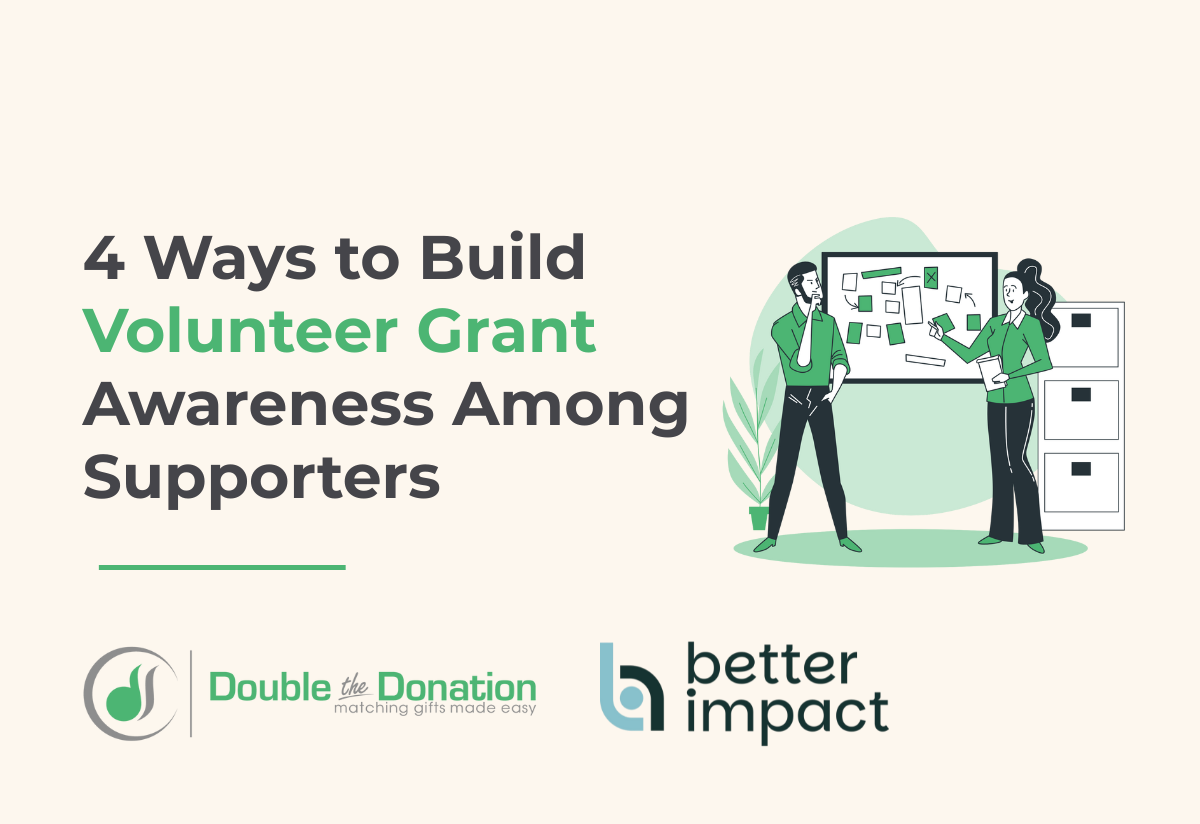4 Ways Your Website Can Feature Your Volunteer Program
The best nonprofit websites are designed to share information about all aspects of an organization. From a nonprofit’s goal to its day-to-day...
4 min read
![]() Double the Donation Team
Sep 24, 2025 9:00:00 AM
Double the Donation Team
Sep 24, 2025 9:00:00 AM

Volunteer grants, also known as “Dollars for Doers,” are corporate giving programs in which companies provide monetary donations to nonprofits where their employees regularly volunteer. It’s a powerful win-win: companies give back to causes their employees care about, and nonprofits increase funding without asking volunteers to give more of their own money. However, many nonprofits are missing out on thousands of dollars in free funding simply because their supporters don’t know the opportunity exists.
If your nonprofit wants to tap into this hidden well of funding, you need to build intentional strategies around volunteer grant education and promotion. In this guide, we’ll break down four practical ways your organization can raise awareness about these programs, driving more grant submissions and strengthening relationships with supporters and corporate partners alike.
We’ll cover the following best practices:
Creating a culture of awareness around volunteer grants starts by embedding the concept into every stage of the volunteer journey. From initial recruitment and training through appreciation and more, each touchpoint offers a prime opportunity to educate, encourage, and empower volunteers to unlock additional funding for your mission.
Let’s dive into the four key strategies for doing so.
Volunteer recruitment is likely one of the first impressions a potential volunteer has of your organization. It's also the perfect moment to showcase the broader impact their time can have. Here’s how to do this effectively:
When advertising volunteer opportunities, make sure to highlight the potential for corporate-sponsored donations through volunteer grants. Whether you're posting on your website, social media, job boards, or distributing flyers, include a clear callout such as: “Many employers will donate to us when you volunteer. Ask your HR department about volunteer grants, or use our handy search tool to find out if your company participates!”
When someone signs up to volunteer, provide them with an onboarding package or orientation that includes information about volunteer grants. This can be a brief flyer, a slide in your orientation presentation, or a section on your website. Ensure it includes:
Promoting corporate incentives right from the start helps volunteers see the value of their time and inspires a deeper level of engagement—not just with your cause, but with the possibility of making their impact go further.
Your staff and volunteer coordinators are key to sustaining long-term volunteer engagement—and that includes promoting corporate giving programs.
Make volunteer grant education a standard part of staff and leadership training. When staff are informed and confident, they’re more likely to proactively bring up volunteer grants in conversations with volunteers and have the knowledge on hand to answer questions effectively.
If your organization uses volunteer management software, consider adding a field that asks volunteers if their employer offers volunteer grants. It’s especially easy to do so if your VMS integrates with Double the Donation Volunteering, like Better Impact!
Regularly scheduled meetings or check-ins with volunteers are another excellent time to reinforce awareness. A quick “did you know” reminder or success story about a recent grant received can plant the seed for more submissions.
Training your internal team to be fluent in volunteer grants creates a ripple effect—each trained staff member becomes an advocate who can inspire dozens of volunteers to take action.
One-time mentions of volunteer grants aren't enough. To maximize their effectiveness, your communication strategy needs to include consistent, clear, and compelling messaging. Here’s how:
This page should explain what volunteer grants are, who offers them, and how to apply, including FAQs and embedded search tools. For the best results, be sure to keep it updated, accessible, and easy to navigate.
From there, you can incorporate the page into your broader volunteer communications by linking back to it for more information.
Include reminders and tips about volunteer grants in your monthly newsletters or targeted emails. For example:
Celebrate volunteers whose employers have submitted grants. Share their stories (with permission) and thank them publicly. Not only does this recognition make those volunteers feel appreciated, but it also serves as a key form of social proof to others.
Once a volunteer reaches a specific number of hours—say 10 or 20—consider automatically triggering an email encouraging them to check with their employer about grant opportunities.
Clear and regular communication keeps volunteer grants top of mind, increasing the likelihood of follow-through and submissions.
Volunteer recognition is a crucial part of retention—and it’s also an ideal moment to promote the added impact volunteers can make through grant submissions.
After a volunteer shift or event, include a line like: “Thank you for your time! Don’t forget: your employer may match your volunteer hours with a donation.”
Just like hours served or goals met, recognize volunteers who successfully submit grants. Include them in award ceremonies, end-of-year thank-you videos, or donor spotlights. This shows that their effort—not just their time, but their advocacy—has tangible value to your organization.
Consider creating a special award category for volunteers who secure the most grant money or refer others to do the same. This gamifies the experience and encourages a culture of maximizing impact.
By integrating volunteer grants into your appreciation efforts, you send a strong message. Volunteer grants aren’t just a bonus; they’re a meaningful and celebrated part of your fundraising strategy.
Volunteer grants offer nonprofits a scalable, sustainable way to increase funding without asking for more time or money from their supporters. But they won’t deliver results unless volunteers know about them and feel empowered to act.
By strategically incorporating volunteer grant awareness into recruitment, training, communication, and appreciation, your nonprofit can:
Most importantly, you’ll maximize the value of every hour donated, turning service into sustained support. Start with one of these strategies today and build from there. The funding is already available; now it's time to claim it.
Featured Posts

The best nonprofit websites are designed to share information about all aspects of an organization. From a nonprofit’s goal to its day-to-day...

Chances are, your nonprofit already recruits volunteers to help run your events, but have you ever thought about how you’re allocating their time?

As a nonprofit professional, you understand how important your volunteer base is to achieving your organization’s mission. Volunteers provide their...